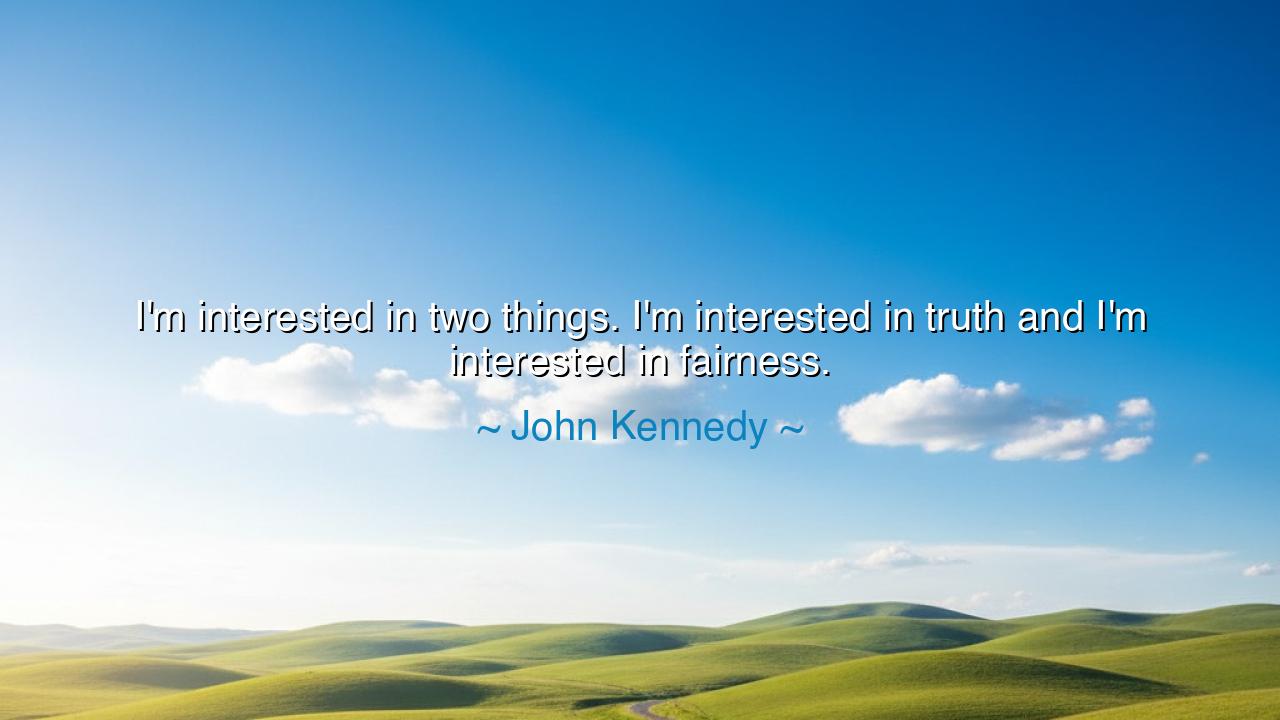
I'm interested in two things. I'm interested in truth and I'm






Hear the noble voice of John F. Kennedy, who once declared with clarity and conviction: “I’m interested in two things. I’m interested in truth and I’m interested in fairness.” In these words we hear the beating heart of justice, the cry of a leader who saw beyond ambition, beyond power, and beyond pride. For truth without fairness becomes cold and merciless, while fairness without truth dissolves into weakness and confusion. Together, these two pillars uphold the house of integrity, without which no man, no nation, no age can endure.
The ancients, too, praised these virtues. The Greeks raised up aletheia—truth—as a divine principle, the very unveiling of reality. The Romans cherished iustitia—justice and fairness—as the bond that held their republic together. Kennedy, standing in the storms of the twentieth century, wove these ancient threads anew. He knew that to guide a people, one must not only reveal what is real but also ensure that every soul is weighed by the same measure, neither exalted unfairly nor cast down unjustly.
Look to history, and behold the struggles where these twin virtues clashed or were betrayed. In the dark days of segregation in America, truth cried out that all men were equal, born of the same dignity. Yet fairness was denied, and millions were chained by laws of inequality. Kennedy, though imperfect like all men, sought to bend the arc toward justice. His leadership in civil rights was born of this union: truth that no man is lesser, fairness that all must share in liberty. Here his words find flesh, for he pursued not power for its own sake, but the higher calling of moral balance.
Consider, too, the story of Abraham Lincoln, whose vision was anchored in the same principles. The truth was plain before him: a nation divided by slavery could not endure. Yet fairness demanded not vengeance upon the South, but mercy, and a restoration that lifted all rather than crushed the defeated. His words—“with malice toward none, with charity for all”—stand as eternal proof that truth and fairness together are the foundation of reconciliation. Without truth, there would have been no end to bondage. Without fairness, the wounds of war could never heal.
Children of tomorrow, let this teaching be etched upon your hearts: truth and fairness are not luxuries, nor ornaments of noble speech, but necessities for the soul and society. When truth is spoken without fairness, it becomes a weapon that wounds rather than heals. When fairness is sought without truth, it descends into compromise with falsehood. Only together do they shine with the light of wisdom.
And what then must you do? In your daily life, speak the truth even when it trembles upon your lips. Yet do so with fairness, remembering that the one who stands before you is also human, bearing struggles unseen. In your work, in your friendships, in your judgments of others, let both principles guide you. Seek not only to be right, but to be just. Seek not only to unveil facts, but to apply them with compassion.
Practical actions follow from this path: listen deeply before you speak, so that your truth may be rooted in understanding. Treat all whom you meet with the fairness you desire for yourself. Defend those who cannot defend themselves, not because it profits you, but because fairness demands it. And when you lead, whether in family, community, or nation, let these two stars—truth and fairness—be your compass, even in the storm.
So remember Kennedy’s vow: “I’m interested in two things. I’m interested in truth and I’m interested in fairness.” Let his words not remain as echoes of the past, but as guiding torches for the present. For if you live by these twin lights, your path will be straight, your spirit unbroken, and your legacy enduring, as one who walked not in shadows, but in the radiance of justice.






TLTran Le
Kennedy’s emphasis on truth and fairness as guiding principles speaks to a moral compass that many of us strive for. But in real-world scenarios, these ideals often face practical challenges. How do we determine what’s truly fair, especially when the truth might not align with everyone’s expectations or desires? Is it possible to be fair without compromising on truth, or do we sometimes need to bend the rules to achieve fairness?
TVNgoc Tram Vo
This quote from John Kennedy is interesting because it sets a clear priority on truth and fairness. In an ideal world, these two would go hand in hand, but often, truth is inconvenient, and fairness can be subjective. In your opinion, is it possible to always be fair while sticking to the truth, especially when it’s difficult? How do we handle situations where fairness and truth seem to be at odds?
LNNgoc Loan Nguyen
Kennedy’s focus on truth and fairness makes me think about how complex these ideals can be in practice. Truth can be subjective, depending on perspective, and fairness can be difficult to achieve when different interests are at play. Do you think that society can truly embody both truth and fairness in every situation? What do you think is more challenging to pursue—truth or fairness, and why?
QTLe Nguyen Quang trung
John Kennedy's quote about truth and fairness really strikes a chord. These two values seem fundamental to a just society, but how often do we see them in conflict? Truth is sometimes uncomfortable, and fairness can feel elusive. Can we ever truly achieve both at the same time, or does one often get compromised for the sake of the other? How do we ensure that truth and fairness guide our actions, both individually and collectively?